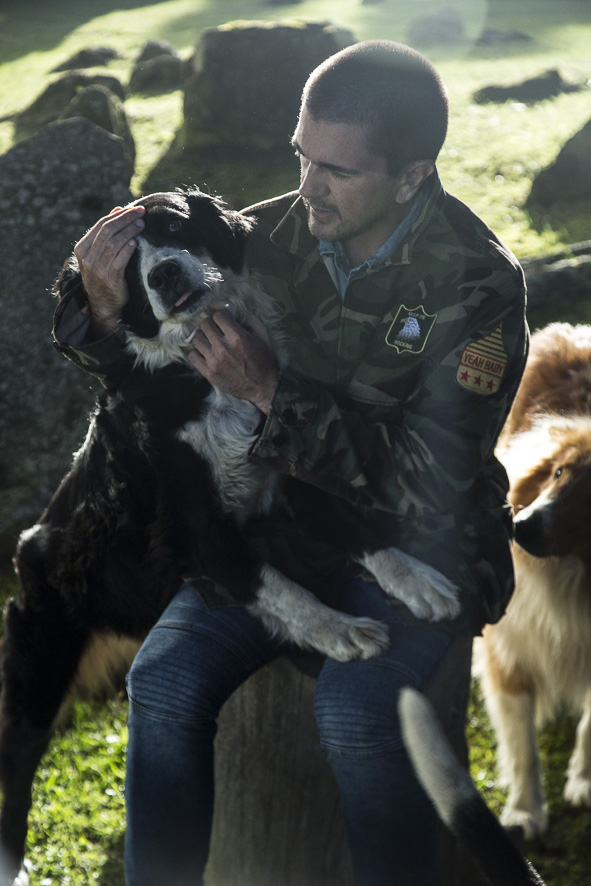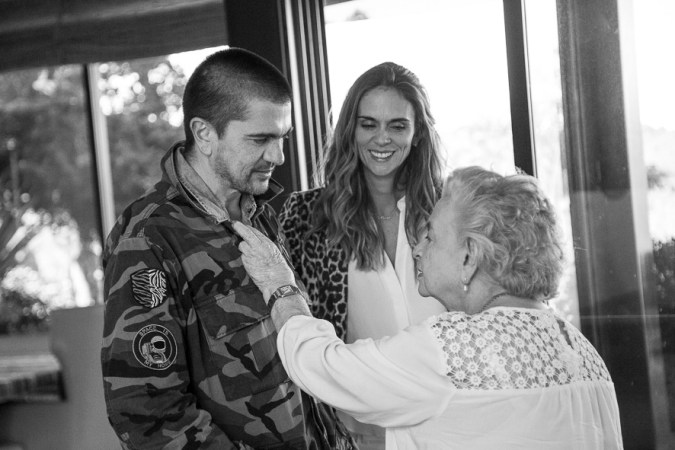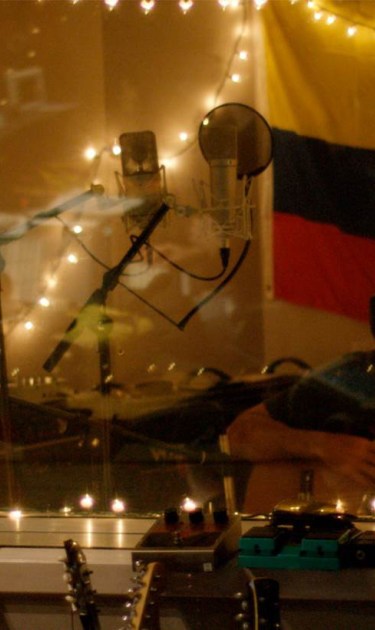Juanes’s Un Día Normal was destroyed at a birthday party; the CD just started skipping from overuse. So I had to buy another one. The songs are full of jumpy guitar hooks, fun beats, and lyrics filled with puns and double entendres. It was pop music in its truest form. The kind of songs you could drive for hundreds of miles to, that you make dinner to, that you could dance to. It was so accessible that it became a major cross over hit. Thus began Juan Esteban Aristizábal’s path to international stardom.
Born in Antioquia, Colombia to working class parents, he started playing the guitar as early as six years old. He and his father and brothers would gather around the living room and play while his mother prepared meals that consisted mainly of rice and beans. These are some of the things we learn via HBO’s short documentary on the Colombian musician titled The Juanes Effect: De Canciones y Transformaciones. It airs on May 19, before an exclusive in-studio concert of his most recent album Mis Planes Son Amarte.
Clearly a lover of puns, the title of the album references the series of music videos he shot for each track of the album that together comprise an intergalactic love story: mis planes son a marte, as in, the planet Mars. This type of play on language is reminiscent of Colombian guasca music, where lyrics are tongue-in-cheek and suggestive. The record is classic Juanes with touches of more current musical styles. Tracks like “Fuego”, “Hermosa Ingrata”, “Es Tarde”, and “Esto No Acaba” have the signature Juanes touch: melodic, catchy, with bouncy rock guitar hooks. Meanwhile, tracks like “Angel” dive into the electro-pop realm. On the albums, you’ll also find collaborations from Colombian notables Fonseca and Kali Uchis. From top to bottom, it makes for a great listen.
Older, calmer, more sure of himself, Juan is ready to let the world in take a peek into his life, and to share himself in new and different ways. He seems to take it in stride, this international superstar thing; a sign that Juan and Juanes can co-exist in peace at last. Despite being a singer/songwriter, there is a quiet energy that seeps from him, that’s so nice to be around, that makes you want to grab a coffee, a chair, and chat. Here’s what he told me.
You’ve always been a relatively open person, especially with your fans. But why open the doors to your life in this way now?
I think that there’s not really a reason. When you feel calm and comfortable, you open the doors. There is always a space for intimacy and privacy, but in this case, when we talk to my mom and my friends, and we even go to my old house, for example, that’s something that I’ve never done. And I thought it would be a cool opportunity. This album; this HBO documentary; this special that we’re doing. I just thought it would be cool. There wasn’t really a reason why. It’s perhaps because I feel calmer, and I didn’t think it would be an issue to share the human part of the songs. I don’t think… I feel trust from the public in order to do it.
“Metallica changed my life forever.”
When you say you’re calmer, can you give me a contrast between the Juanes of twenty years ago and today’s?
For example, twenty years ago, not speaking about the music but the personality. Maybe I was more timid or more shy or I wasn’t sure if I was doing the right thing, all those types of questions you ask yourself about your own behavior. But through the years and the experience that life gives you, I feel much more relaxed. More mature and calmer and suddenly… What’s more, when I went with [the film crew] to visit my old house, it was really beautiful. I even needed it. And I enjoyed the experience.
I noticed in the documentary that you listened to Slayer and Megadeath.
Totally.
And that you went to a Kraken concert.
Yes.
Things that left me thinking “Wow,” because it’s music that’s very different than the kind you make.
Yes, of course. Look, really my introduction to music was through popular music. When I was eight or nine years-old, what I was exposed to at home was the music my parents listened to, what my brother listened to. So that was Los Visconti, Los Chachaleros, Lucho Gatica, Carlos Gardel, Silvio Rodriguez, all of that music. That was what I first listened to before any other kind of music. And then at thirteen years old, when I was in school, I started to become more interested in rock. I went crazy over rock. I loved it. I lost my head over it– in the best sense. Groups like Slayer but more mostly Metallica, which is to-date the band that still inspires me to do this stuff, changed my life forever. It was the connection to the electric guitar, the attitude of rock. That was a very important era for Medellin. It was very hard but important, because it was through music, through that connection I made with my friends, that we managed to protect ourselves from many things that were going on. And well, it’s now part of what I like to listen to, a lot of rock music and all sorts of music. To this day, I don’t have any prejudices.
The soundtrack of all Colombians is Diomedes Diaz.
What are you listening to right now? Any contemporary music that you like?
For example, the new Natalia Lafourcade album Musa seems like the most beautiful thing to me, because it’s like music from that time that I listened to as a kid, but new again through her– very cool. Mon Laferte is brutal, a Chilean woman who sings very well. I listen to everything. I put on Spotify and I listen to everything from Drake to J. Balvin to Carlos Vives to Bruno Mars. Everything. And then I look for more specific things like Pink Floyd, Led Zeppelin. I just bought Café Tacuba’s new album, and have listened to it and like it. Beck. Classical music. Popular music. Everything.
Now, like Shakira and Vives, you are now part of Colombian popular music. Many people don’t understand that Colombia’s popular music tradition encompasses everything from bullerengue to bambuco. How would you explain your influences to someone who doesn’t know much about Colombian music?
As I was growing up, I was always surrounded by Joe Arroyo, Toto La Momposina, guasca music – that’s more from my region like Octavio Mesa. African music. In my house there were African music albums. Why? I have no idea. But those albums were in my house when I was kid, and listened to them. I loved it. Cumbia and the connection it has to mapale on the African side. That as well as reggae, funk, rock, a bit of 90s hip-hop. Artists like Diomedes Diaz for example, I’ve loved since I was kid. All of my life his songs have… I would say that Joe Arroyo and Diomedes have left an impression on me musically.

The soundtrack of all Colombians is Diomedes Diaz.
Yes!
All of our rites of passage are marked by Diomedes.
And specially in Medellin. Medellin is the kind of city that loves Vallenato in a really incredible way. It’s very strong what happens in Medellin with vallenato.
Colombia’s post-conflict process could last another fifteen or twenty years. But if you don’t start now, then when?
Over the last twenty years you have changed a lot. Colombia has changed a lot. What have you seen happen to country? How has it affected you? What are your hopes for the future?
Speaking about the past, I think it’s been really hard for Colombians to not have hope. Before, we lived with this war, and the guerilla, mafia, narco-trafficking, corruption; we had gotten used to it. The peace process became a possibility, and at first it was really inspiring. Like, “Wow, this is so great.” Things are going to change. But I ran up against a heavy wall of polarization. Even in my own family, people who think “Yes,” and others think “No.” But in spite of all that, I refuse to be negative about the country’s future. I think we have to change our attitude. It’s not going to be easy; things have never been easy, but they have become easier now. The implementation of the peace accords is only beginning. Colombia’s post-conflict process could last another fifteen or twenty years. But if you don’t start now, then when? So I think that it’s too early to say “Yes” or “No” but what I do think is true, for me, is I do believe we’re on the right path. I don’t think Colombia would ever allow for a Castro-Chavismo to be implemented; Colombia would self-destruct before allowing that to happen. That’s what I think. Our story is different than Venezuela’s and it can’t be compared.

As people we always aspire to be better. What do you think you’ve improved about your character and what are you still working on?
I think what’s improved is that I’ve reconnected with who I was when I was a kid. You know what I mean? You’re born pure, clean, and you’re what you are– you’re essence. But as you get older you start to get so much information that you become overwhelmed. I’ve started to remember what I was like when I was twelve, thirteen years old, what motivated me. Why I did the things I did. I watched home movies and thought, “Hey, I was like that! Why can’t I be like that again?” And right now I feel like I can’t forget who I truly am. It’s the opposite. That has been for me a great lesson to learn now. The years and the good and bad experiences have shaped the character and for that reason today I feel calmer, and more sure of what I’m doing. Now I’m sure of the things I don’t like. And that’s with everything: the musical side, the personal side, everything.
And what do you still have to improve?
Well, a lot! The process never ends. You’re learning until you die because on this path you’re learning to love, and that’s very difficult. And you have to start with yourself. You have to love yourself without worrying what people think; feeling proud of oneself, loving oneself. So that you can give that love to other people.




